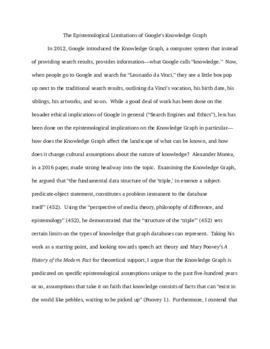| dc.creator | Terry, Jeffrey | |
| dc.date.accessioned | 2017-05-10T21:01:42Z | |
| dc.date.accessioned | 2021-04-14T14:56:27Z | |
| dc.date.available | 2017-05-10T21:01:42Z | |
| dc.date.available | 2021-04-14T14:56:27Z | |
| dc.date.issued | 2017 | |
| dc.identifier.uri | https://hdl.handle.net/11244.46/1277 | |
| dc.description.abstract | In 2012, Google introduced the Knowledge Graph, a computer system that instead of providing search results, provides information—what Google calls “knowledge.” Now, when people go to Google and search for “Leonardo da Vinci,” they see a little box pop up next to the traditional search results, outlining da Vinci’s vocation, his birth date, his siblings, his artworks, and so on. While a good deal of work has been done on the broader ethical implications of Google in general (“Search Engines and Ethics”), less has been done on the epistemological implications on the Knowledge Graph in particular—how does the Knowledge Graph affect the landscape of what can be known, and how does it change cultural assumptions about the nature of knowledge? Alexander Monea, in a 2016 paper, made strong headway into the topic. Examining the Knowledge Graph, he argued that “the fundamental data structure of the ‘triple,’ in essence a subject-predicate-object statement, constitutes a problem immanent to the database itself”. Using the “perspective of media theory, philosophy of difference, and epistemology”, he demonstrated that the “structure of the ‘triple’” sets certain limits on the types of knowledge that graph databases can represent. Taking his work as a starting point, and looking towards speech act theory and Mary Poovey’s A History of the Modern Fact for theoretical support, I argue that the Knowledge Graph is predicated on specific epistemological assumptions unique to the past five-hundred years or so, assumptions that take it on faith that knowledge consists of facts that can “exist in the world like pebbles, waiting to be picked up”. Furthermore, I contend that the Knowledge Graph, through Michel Foucault’s notion of the “will to truth,” limits what we can know by promoting a narrow definition of “the true discourse”. | |
| dc.description.abstract | About the author: A native of Norman, Oklahoma and an alumnus of Norman High School, Jeffrey Terry came to OU on a National Merit Scholarship. Initially a Math & Computer Science double major, Jeffrey decided after a persuasive exposure to the discipline of English to become an English professor. In the future, Jeffrey aims to study and teach the discipline to the next generation of humanities scholars. In graduate school, Jeffrey wishes specifically to research the effects of technology on human culture. Jeffrey wants to figure out what these new tools we have------phones, computers, smart watches, etc.------ mean for people, and how, broadly speaking, they shape and perhaps reshape the human experience. | |
| dc.description.abstract | University Libraries Undergraduate Research Award | |
| dc.format.extent | 18 pages | |
| dc.format.extent | 369,406 bytes | |
| dc.format.medium | application.pdf | |
| dc.language.iso | en_US | en_US |
| dc.relation.requires | Adobe Acrobat Reader | |
| dc.rights | Attribution-NonCommercial-ShareAlike 3.0 United States | * |
| dc.rights.uri | https://creativecommons.org/licenses/by-nc-sa/3.0/us/ | * |
| dc.subject | University Libraries Undergraduate Research Award | |
| dc.subject.lcsh | Linked data | en-US |
| dc.subject.lcsh | Semantic computing | en_US |
| dc.subject.lcsh | Knowledge, Theory of | en-US |
| dc.subject.lcsh | Google | en-US |
| dc.title | The epistemological limitations of Google's Knowledge graph | en_US |
| dc.type | Document | |
| dc.type | text | |
| dc.description.undergraduate | undergraduate | |

